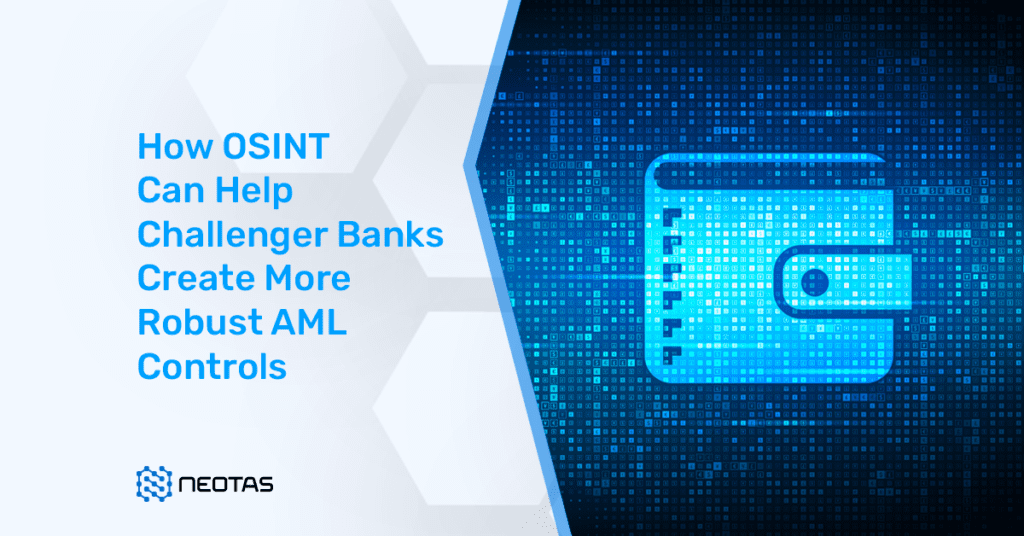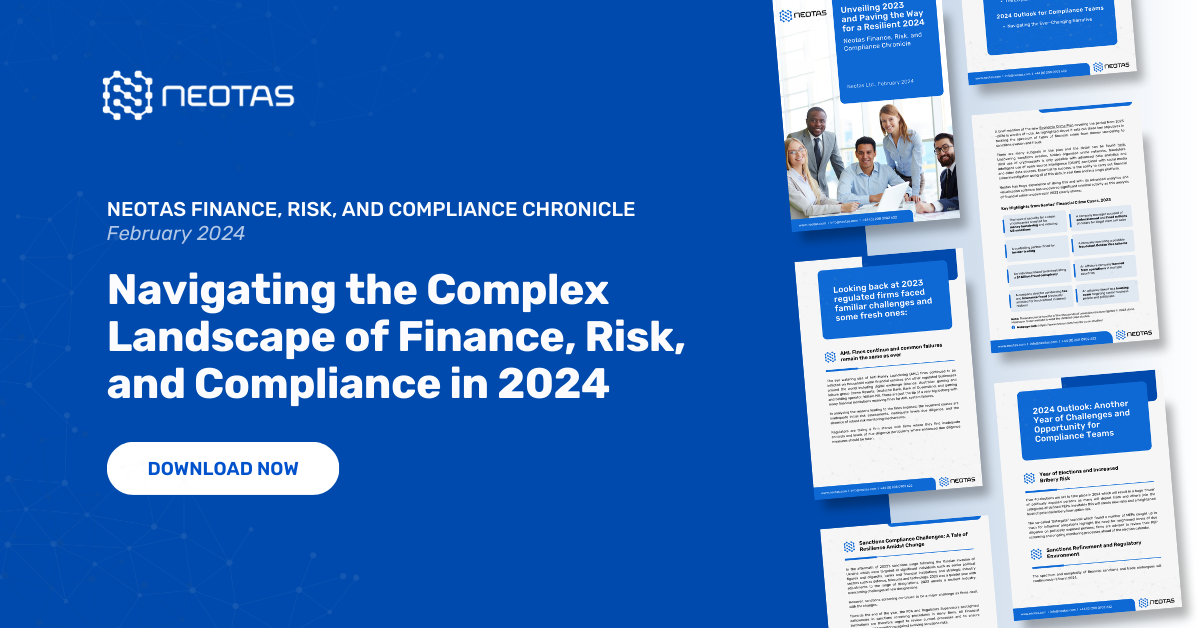OSINT for AML Compliance
FCA Warns Challenger Banks Over AML Compliance Shortcomings
In the latest reproach from the FCA to anti-money-laundering regulated firms across the financial services industry, Challenger Banks were criticised for failing to implement robust AML controls in line with money-laundering regulations. This is hot on the heels of a similar reprimand in 2021 when the FCA wrote to all UK retail banks in a ‘Dear CEO’ letter highlighting a wide range of compliance shortcomings including AML controls.
AML Regulations were last reinforced in 2020, when the requirements of the 5th Money Laundering directive were implemented, with the most recent updates particularly targeting digital financial services organisations, including the cryptocurrency sector.
Challenger Banks Facing New AML Challenges
In the most recent National Risk Assessment of money laundering and terrorist financing 2020, the entire retail banking sector remains ‘high-risk’ for fraud and money laundering. The NCA specifically stated “criminals may be attracted to the fast on-boarding process that Challenger Banks advertise, particularly when setting up money mule networks”.
The review exposed a core difficulty felt by the rise of Challenger Banks, where the need for rapid customer growth has led to inadequate compliance procedures for many organisations.
The findings included weak customer risk assessment, insufficient enhanced due diligence practices and a lack of alignment with AML procedures.
Implementing a Risk-Based Approach
As with all financial crime compliance controls, the Risk-Based Approach (RBA) is key to the entire process. Implementing a proper risk assessment procedure by carefully assessing any financial crime risks with both new and existing customers is essential.
In practice this means that firms must obtain all the information needed on both prospective and actual customers activities, business operations, industries involved in, geographies and what services are required. Well documented policies and procedures are vital and full training of compliance teams in their application is essential.
In an increasingly digital and fast-moving customer environment, all financial services organisations including Challenger Banks need to digitally transform their KYC processes.
Many organisations still rely heavily on manual and outdated AML systems particularly in the area of enhanced due diligence. Reliance on search engines and disparate data sets with analysts spending disproportionate amounts of time looking for the possible ‘needle in the haystack’ still characterises the typical approach to EDD. It is both an inefficient and ineffective approach.
The FCA itself recognises and supports the value of Open Source Intelligence (OSINT) in risk management and that a data-led approach is vital. This means using advanced analytical techniques such as machine learning and natural language processing to obtain actionable risk intelligence swiftly and accurately, to help manage financial crime risk.
With increasing penalties, fines and even criminal prosecution, Challenger Banks need to quickly implement controls and processes that not only fully meet their AML regulatory obligations, but are also effective at quickly identifying and dealing with suspicious activity.
Using The Right Tools
Using the Neotas technology, Challenger Banks are able to conduct more in-depth investigations and enhanced due diligence checks on higher risk customers swiftly and efficiently. What’s more, as the bank grows, the solution is scalable and future proof.
The best approach to enhanced due diligence should include carrying out searches of the entire internet, including social media and the dark web in real time, without being drowned in irrelevant results. Findings should be connected and analysed alongside established data sources such as PEPs, Sanctions, Adverse Media and Corporate to help remove blind spots from the process. Reliance on traditional, curated data sets and search engines will lead to critical risk information being missed.
Many firms are already discovering that OSINT for AML is transforming customer due diligence and adoption of the technology is increasing all the time.
Case Study: Money Laundering Fraudster Caught Via Hidden Aliases
The FCA has asked all firms in the sector to review their approach to identifying and dealing with the financial crime risks they are exposed to and ensure they are fit for purpose. They have also requested that firms be prepared to report on their progress in developing the AML control frameworks as part of their compliance monitoring programme.
OSINT can be a key tool as firms review their processes. Managing higher risk customer relationships with enhanced due diligence and investigating suspicious activity in Challenger Banks can be fully met using Neotas’ advanced Platform.
Improvements in speed and accuracy of these processes of up to 60% are frequently cited by customers while maintaining regulatory compliance. This is vital to ensuring the customer experience remains seamless and the competitive edge that Challenger Banks have carved out in the market.
OSINT for Challenger Bank AML Controls:
In the fast-evolving landscape of financial services, challenger banks are revolutionizing the industry with innovative approaches. However, as they disrupt traditional banking, they also face unique challenges, including the need for robust Anti-Money Laundering (AML) controls. Open Source Intelligence (OSINT) can be a game-changer in this regard. This article explores how challenger banks can leverage OSINT to fortify their AML strategies. By harnessing the power of publicly available information, they can enhance customer due diligence, monitor transactions effectively, and identify potential risks. Discover how OSINT empowers these agile financial institutions to stay compliant, secure, and competitive in the market.
To discuss your AML needs, schedule a call with our team here. To request a demo of our Platform, please head here.
Michael Harris
Head of Financial Crime Risk
Related Content on OSINT, AML Compliance, and Financial Due Diligence.
- Using OSINT for Sources of Wealth Checks in AML Compliance
- How Open Source Intelligence (OSINT) is transforming enhanced due diligence and investigations in AML compliance
- Network Analysis and Due Diligence – Terrorist Financing Uncovered In Subject’s Network
- Regulators now require OSINT – what next for AML and CDD?
- OSINT Can Help Challenger Banks Create More Robust AML Controls
- AML Compliance – All You Need To Know About Anti-Money Laundering
- Webinar: The Power of Open Source Intelligence (OSINT) in the Fight Against Financial Crime
- Management Due Diligence | Executive Assessment & Diligence
- Identifying and Assessing External Threats and Opportunities with Corporate Intelligence
- OSINT, OSINT Tools and Techniques, OSINT Techniques, OSINT Framework, OSINT Methodology, OSINT Background Check
- What is Customer Due Diligence in Banking and Financial Services?
Due Diligence Solutions:
- Enhanced Due Diligence
- Management Due Diligence
- Customer Due Diligence
- Simplified Due Diligence
- Third Party Risk Management
- Open Source Intelligence (OSINT)
- Customer Due Diligence Requirements
- Risk-Based Approach (RBA) to AML & KYC risk management
- Anti-Money Laundering (AML) Compliance and Checks
- Introducing the Neotas Enhanced Due Diligence Platform



 Financial Crime Compliance Trends 2024
Financial Crime Compliance Trends 2024












